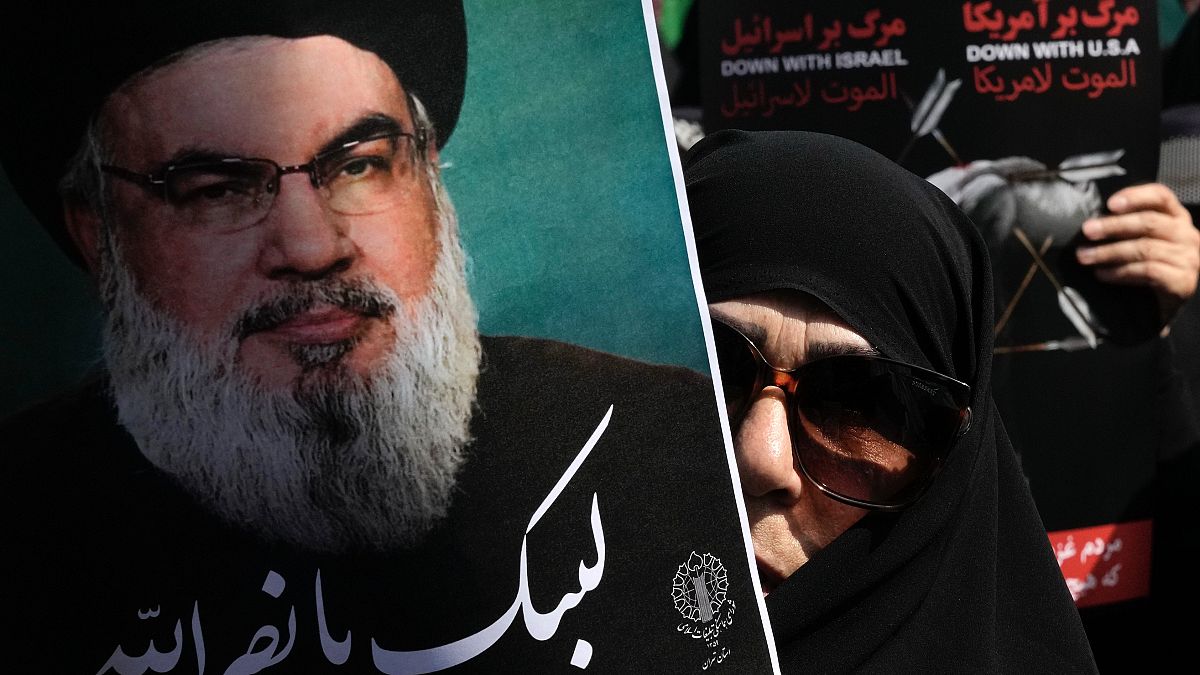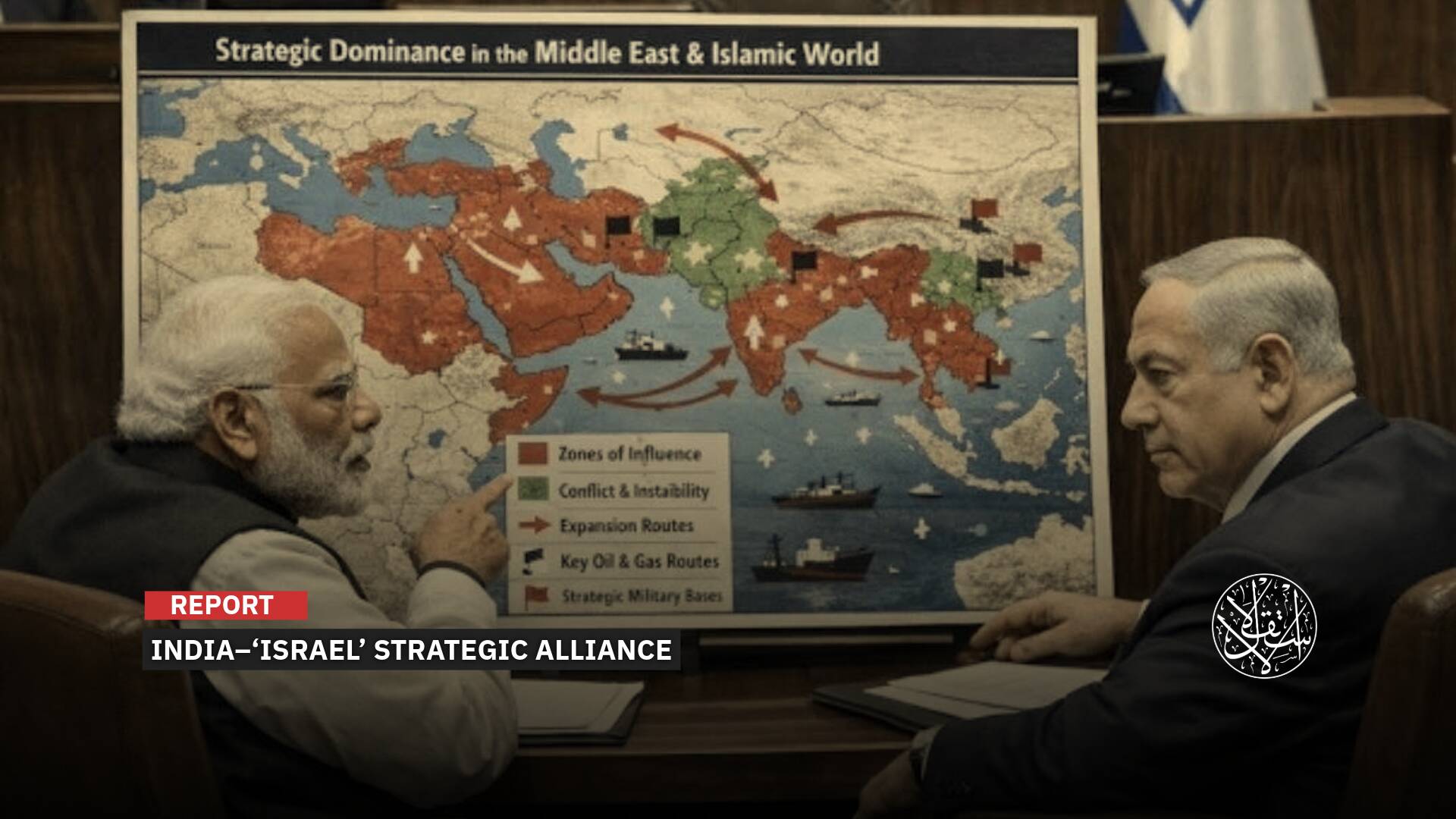Hezbollah Struggles to Maintain Power Amid Growing Challenges

His closest allies disown him, leaving him isolated domestically, regionally, and internationally.
Despite "Israel’s" announcement that it will continue occupying five strategic points along the Lebanese border—establishing bases there following the expiration of the wartime truce—Hezbollah did not react as strongly as it had over the past two decades.
The party settled for a weak warning from Secretary-General Naim Qassem on February 17, 2025, stating that "Israel's" plans to keep troops “temporarily” in five points in southern Lebanon "would violate the agreed-upon deadline for the full withdrawal of Israeli Forces."
"There are no excuses, no five points," he declared, offering no further details, no ultimatums, and no warnings of retaliation.
Rather than issuing its usual threats of retaliation, Hezbollah has placed responsibility for reclaiming Lebanese territory squarely onto the state.
“The Lebanese government must take a firm stand and say no,” the group stated, implying that any "Israeli" presence beyond the agreed deadline would constitute a breach of the deal.
Some Lebanese analysts and politicians view this as an attempt to retreat behind the state—deflecting its internal crisis onto the government while fueling accusations of betrayal against President Joseph Aoun and Prime Minister Nawaf Salam.
Others, however, believe Hezbollah’s focus remains on the funeral of its Secretary-General, Hassan Nasrallah—a moment that could redefine its strategy.
Some analysts suggest the group is deliberately allowing the Lebanese state to take the lead in negotiations, anticipating its failure to expel "Israeli" forces.
If that happens, Hezbollah could later position itself as Lebanon’s sole protector, reinforcing the argument that its weapons—not the national army—are indispensable for the country’s defense.

Hezbollah’s Dilemma!
Following the end of the war in Lebanon and the appointment of a new president and prime minister—whose agendas diverge, at least in part, from Hezbollah’s—a clear shift has begun to emerge in the Lebanese state’s approach to the group for the first time in decades.
The first sign came in the president’s inaugural speech, which, for the first time in over 25 years, made no mention of “the resistance”—a term long used to frame Hezbollah as a pillar of national strength.
Instead, the new president reaffirmed the state’s exclusive right to bear arms, signaling a direct challenge to the group’s military autonomy.
The second came in the government’s ministerial statement, which, also for the first time, omitted any reference to “the role of the resistance in defending Lebanon.”
The move points to a concerted effort to strip Hezbollah of its legitimacy as the country’s defender, setting the stage for a post-Hezbollah era and weakening the influence of its key backer, Iran.
Third, the Lebanese army has shattered its long-standing principle of avoiding direct confrontation with Hezbollah.
The turning point came after Iranian aircraft were barred from landing at Beirut’s airport, triggering clashes between the army and Hezbollah supporters who had blocked access to the facility. The fallout has led to a collapse of trust between the two sides.
Despite this, political analyst Qassem Qassir, known for his proximity to Hezbollah, maintained that the group "stands behind the Lebanese state and army."
However, he hinted at potential escalation, stating that "if the occupation persists, resistance is a natural right."
He stopped short of specifying whether such resistance would take the form of renewed conflict or alternative measures.
Speaking to Saudi newspaper Asharq al-Awsat on 18 February, Qassir said Hezbollah had yet to determine the precise nature of its response.
"The party has multiple options—military, political, and popular—but the details will be left for a later stage," Qassir remarked.
Retired Lebanese Brigadier General George Nader, however, believes Hezbollah’s options have significantly narrowed. He dismissed the likelihood of the group resorting to armed confrontation, arguing that it has "lost the capacity to wage war following the heavy blows inflicted by Israel."
“Hezbollah’s problem is not just military but also political,” Nader told Asharq al-Awsat, pointing to the group’s growing isolation. “Its closest allies are distancing themselves, leaving it cut off domestically, regionally, and internationally.”
Nader argues that with the land route between Tehran and Beirut effectively severed following the collapse of the Assad regime—alongside the recent air blockade preventing Iranian flights from landing in Lebanon—the prospect of Hezbollah engaging in a new military confrontation with Israel has become highly unlikely.
According to Munir Rabie, editor-in-chief of Lebanese newspaper Al-Modon, "Israel’s" insistence on maintaining its occupation of strategic positions in Lebanon has only served to push Hezbollah towards further militarization.
On February 22, Rabie argued that as long as Israeli Occupation Forces continue to hold Lebanese territory, Hezbollah will refuse to disarm or accept state control over its arsenal.
"On the contrary," he wrote, "the group will persist in strengthening its military position and expanding its capabilities."
Before Operation al-Aqsa Flood and the subsequent "Israeli" war on Lebanon, indirect Lebanese-Israeli negotiations had been underway to finalize the demarcation of the land border, with 13 disputed points under discussion. Seven had been resolved, while six remained contested.
However, in the course of the current conflict, Israeli Occupation Forces have seized all 13 of these points, violating UN Resolution 1701.
Moreover, "Israel" has now laid claim to five additional positions inside Lebanese territory.
This shifting reality, Rabie suggested, fundamentally alters the framework for border negotiations—making Hezbollah’s military strength even more central to Lebanon’s strategic calculations.

Hezbollah Strikes Back
After assessing the political fallout of its military intervention in Gaza—and recognizing its need for time to recover militarily and organizationally—Hezbollah appears to have chosen a new strategy: retreating behind the Lebanese state.
Unlike in previous conflicts, the group has refrained from direct military action against "Israel’s" occupation of Lebanese territory.
Instead, it has sought to highlight the weakness of the president and government, portraying them as incapable of defending the country without Hezbollah’s presence.
Hezbollah has responded by targeting key state figures, accusing both the president and the prime minister of betrayal—a move that underscores the growing political and security tensions in Lebanon, as noted by several Lebanese commentators.
Supporters of the group launched a fierce online campaign against Michel Aoun and Nawaf Salam, flooding social media with attacks.
What began as political criticism quickly escalated into accusations of treason. Aoun and Salam were branded as "agents of Israel" and accused of "serving foreign interests," with their decisions—particularly the ban on Iranian aircraft landing in Beirut—dismissed as nothing more than "the execution of Western agendas."
In the town of Jarmak-al-Aaishiyah in Lebanon’s Jezzine district, Hezbollah supporters defaced a memorial dedicated to the president, scrawling the party’s slogan and the name of its late secretary-general, Hassan Nasrallah, according to Lebanese media reports.
Hezbollah later issued a statement condemning the attack, describing it as a "provocative and suspicious act of sedition" and calling on supporters to resist any attempts to destabilize the country.
Lebanese journalist Josephine Deeb, writing for the liberal news platform Asas Media on 16 February, warned Hezbollah that escalating tensions on the streets and clashing with the army would only backfire. "When will the party admit to its supporters that the balance of power in the region has shifted?" she asked.
Citing sources close to Hezbollah, Deeb suggested that the unrest among its supporters stemmed from multiple factors, including a breakdown in communication between the party’s leadership and its base, as well as an awareness that losing the war would inevitably force political concessions—something Hezbollah seeks to delay through a gradual retreat rather than an immediate climbdown.
Another key challenge, she argued, is the party’s inability to manage the growing frustration among its followers, many of whom had grown accustomed to wielding influence and power in Lebanon.
The absence of Hassan Nasrallah’s strong leadership has further weakened Hezbollah’s grip on its support base, she noted, as he was once able to control both the party’s internal ranks and the broader street movement.
However, political analyst Kassem Kassir believes the eruption of Hezbollah-affiliated protests against the state is driven by deeper factors.
The mounting pressures on the group, he warned, could push its supporters towards violent actions beyond the traditional political and party structures.
Hezbollah Weakness
Lebanese political and media assessments suggest that Hezbollah and its current leadership are acutely aware of their weakened state and the long road to recovery ahead.
In an apparent attempt to counter this fragility, Hezbollah has placed significant emphasis on organizing a large-scale public funeral for its former leader, Hassan Nasrallah, who was killed in an Israeli airstrike on September 27, 2024.
According to Lebanese journalist Albert Kostanian, speaking to France 24 on February 21, the funeral carries “profound political symbolism.”
“After the party’s resounding defeat, Hezbollah now seeks to project strength, to signal that it is still standing—or at the very least, still present on the battlefield,” Kostanian noted.
Despite the humiliating reality Hezbollah faces in southern Lebanon, the group continues to assert that it emerged victorious from its confrontation with "Israel."
Seizing on Hezbollah’s moment of vulnerability, "Israel" appeared to issue a veiled threat.
On February 19, Maariv suggested that the group’s leader could be targeted during Hassan Nasrallah’s funeral on February 23.

Maariv provocatively asked in its report, “'Israel' wasn’t invited to Nasrallah’s funeral—will its air force attend instead?”
Echoing the tension, the Lebanese channel MTV, known for its opposition to Hezbollah, mocked the group’s precarious position, pointedly asking, “Will 'Israel' strike on the day of the funeral?”

Before its latest standoff with the Lebanese state, Hezbollah had been working to reassert its influence, attempting to revive the long-standing “army, people, and resistance”—a formula designed to cement its role as an equal partner alongside the Lebanese government and military.
The group had pushed to enshrine this principle in the policy statement of the incoming government, as had been customary in previous administrations, where the "resistance" was formally acknowledged.
However, the shifting dynamics between Hezbollah, the state, and the army have instead exposed the party’s weakened position.
In a significant departure from past practice, the government’s statement made no mention of the "army, people, and resistance" formula, effectively sidelining Hezbollah’s claim to parity with the Lebanese military.
Adding to this, both President Joseph Aoun and Prime Minister Nawaf Salam reaffirmed the state’s exclusive right to bear arms.
What began as an attempt to shield itself behind the state while projecting strength ultimately forced Hezbollah into hiding behind the state from a position of weakness.
A study by the Malcolm H. Kerr–Carnegie Middle East Center, published on January 29, 2025, suggested that Hezbollah had sought to destabilize the emerging political order, which the Americans, Saudis, and French were actively working to establish.
The study further claimed that Hezbollah was determined to obstruct the president’s key pledge—reinforcing the state’s monopoly on armed power.
Meanwhile, The Times reported on January 26 that the head of military intelligence for southern Lebanon had leaked classified information from meetings of the Quintet Committee, which oversees the implementation of the ceasefire agreement.
Citing an “intelligence report,” the newspaper alleged that the officer—himself from southern Lebanon—was “one of dozens of Lebanese army officers who funneled information to Hezbollah, providing advance warnings about raids targeting the group’s weapons stockpiles in the south.”
Although the Lebanese Armed Forces later denied the report, the possibility of such leaks prompted President Aoun to fast-track strategic appointments, ensuring that Lebanon could enforce the terms of the ceasefire and UN Resolution 1701.
By shaping the composition of the new government, Aoun sought to consolidate his grip over the military and security apparatus, appointing loyal figures to head the defense and interior ministries.
The move further stripped Hezbollah of key levers of influence it had long taken for granted.












